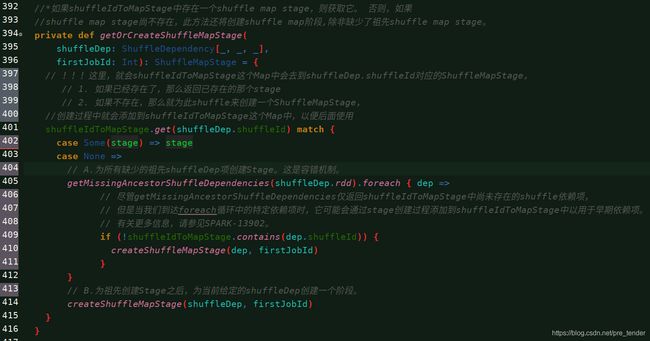Spark DAG之处理SubmittedJob并划分Stage
文章目录
- 概要
- 1. Stage介绍
- 1.1 父类Stage定义
- 1.2 子类ShuffleMapStage、ResultStage
- 2. 处理SubmittedJob事件
- 3. 划分Stage
- 致谢
- 附录
概要
介绍Stage的定义,DAGScheduler划分Stage流程。
1. Stage介绍
原理相关的介绍,我们在RDD运行原理一文中有介绍过,这里再啰嗦一下:
一个job通常包含一个或多个stage。各个stage之间按照顺序执行。上面已经说过,一个job会有多个算子操作。这些算子都是将一个父RDD转换成子RDD。这个过程中,会有两种情况:父RDD中的数据是否进入不同的子RDD。如果一个父RDD的数据只进入到一个子RDD,比如map、union等操作,称之为narrow dependency(窄依赖)。否则,就会形成wide dependency( 宽依赖),一般也成为shuffle依赖,比如groupByKey等操作。
job中stage的划分就是根据shuffle依赖进行的。shuffle依赖是两个stage的分界点。shuffle操作一般都是任务中最耗时耗资源的部分。因为数据可能存放在HDFS不同的节点上,下一个stage的执行首先要去拉取上一个stage的数据(shuffle read操作),保存在自己的节点上,就会增加网络通信和IO。Shuffle操作其实是一个比较复杂的过程,这里暂且不表。
1.1 父类Stage定义
查看父类Stage的说明:

查看类定义:

Stage中有两个重要属性,rdd和parents,分别记录的是切分处的RDD和父Stage信息,这一点结合我后面的例子更好理解。

1.2 子类ShuffleMapStage、ResultStage
Stage有两个子类,ShuffleMapStage、ResultStage,两者分别增加了一个重要属性信息,如下:
| Stage类别 | 差异属性 | 作用 |
|---|---|---|
ShuffleMapStage |
shuffleDep: ShuffleDependency | 保存Dependency信息 |
ResultStage |
func: (TaskContext, Iterator[_]) => _ | 保存action对应的处理函数 |
2. 处理SubmittedJob事件
上一篇博客Spark DAG之SubmitJob最后讲到调用DAGScheduler的handleJobSubmitted方法处理JobSubmitted事件,查看该方法 :

如上图注释处,handleJobSubmitted方法主要职责如下
- 调用
createResultStage()方法,划分DAG生成Stage。 - 创建
ActiveJob,并添加到对应集合管理。 - 调用
submitStage()提交Stage。
3. 划分Stage
首先说明下,在一个Job的DAG中(,例如
中,存在了多个Stage : 四个ShuffleMapStage、一个ResultStage
在这里:
SMS1、SMS3是RS的parentSMS0、SMS2是RS的ancestor
细说下ResultStage的创建流程:
- 在createResultStage中要创建并返回ResultStage,因此我们需要先获取ShuffleDependencies,根据这些依赖来获取或者创建ShuffleMapStages-----这些是它的parents。(也即是我们就需要去获取上图中的SMS1、SMS3。)
- 而在创建ShuffleMapStages(SMS1、SMS3)之前,会检查,发现它会去使用到ancestor(SMS0、SMS2)的数据,因此首先会通过依赖关系创建SMS0、SMS2(如果不存在),然后才来创建SMS1、SMS3。



到这里,就是创建createShuffleMapStage来创建ShuffleMapStage了
那么再说下ShuffleMapStage创建流程:与ResultStage类似,除了变成了
- 在createShuffleMapStage
- 在实际创建ShuffleMapStages时,其实与创建ResultStage是很类似的,只不过同样调用的是getOrCreateParentStages()方法,然后后面的流程完全一样。
< 在任何ShuffleMapStages创建时,它都会被添加到shuffleIdToMapStage这个Map中进行维护,方便后续使用。>

具体的例子这里不赘述,可以参考文章Spark DAG之划分Stage
致谢
-Spark DAG之划分Stage
- 理解spark中的job、stage、task
附录
-----------------DAGScheduler.scala handleJobSubmitted()、---------------------------------
private[scheduler] def handleJobSubmitted(
jobId: Int,
finalRDD: RDD[_],
func: (TaskContext, Iterator[_]) => _,
partitions: Array[Int],
callSite: CallSite,
listener: JobListener,
properties: Properties) {
var finalStage: ResultStage = null
try {// 例如,如果在已删除其基础HDFS文件的HadoopRDD上运行作业,则新stage创建可能会引发异常。
// 1. 划分Stage,返回ResultStage,和RDD保存父RDD类似,Stage使用parents属性保存父Stage
finalStage = createResultStage(finalRDD, func, partitions, jobId, callSite)
} catch {
case e: BarrierJobSlotsNumberCheckFailed =>
logWarning(s"The job $jobId requires to run a barrier stage that requires more slots " +
"than the total number of slots in the cluster currently.")
// If jobId doesn't exist in the map, Scala coverts its value null to 0: Int automatically.
val numCheckFailures = barrierJobIdToNumTasksCheckFailures.compute(jobId,
new BiFunction[Int, Int, Int] {
override def apply(key: Int, value: Int): Int = value + 1
})
if (numCheckFailures <= maxFailureNumTasksCheck) {
messageScheduler.schedule(
new Runnable {
override def run(): Unit = eventProcessLoop.post(JobSubmitted(jobId, finalRDD, func,
partitions, callSite, listener, properties))
},
timeIntervalNumTasksCheck,
TimeUnit.SECONDS
)
return
} else {
// Job failed, clear internal data.
barrierJobIdToNumTasksCheckFailures.remove(jobId)
listener.jobFailed(e)
return
}
case e: Exception =>
logWarning("Creating new stage failed due to exception - job: " + jobId, e)
listener.jobFailed(e)
return
}
// Job submitted, clear internal data.
barrierJobIdToNumTasksCheckFailures.remove(jobId)
val job = new ActiveJob(jobId, finalStage, callSite, listener, properties)
clearCacheLocs()
logInfo("Got job %s (%s) with %d output partitions".format(
job.jobId, callSite.shortForm, partitions.length))
logInfo("Final stage: " + finalStage + " (" + finalStage.name + ")")
logInfo("Parents of final stage: " + finalStage.parents)
logInfo("Missing parents: " + getMissingParentStages(finalStage))
val jobSubmissionTime = clock.getTimeMillis()
jobIdToActiveJob(jobId) = job
activeJobs += job
finalStage.setActiveJob(job)
val stageIds = jobIdToStageIds(jobId).toArray
val stageInfos = stageIds.flatMap(id => stageIdToStage.get(id).map(_.latestInfo))
listenerBus.post(
SparkListenerJobStart(job.jobId, jobSubmissionTime, stageInfos, properties))
//提交Stage
submitStage(finalStage)
}
--------DAGScheduler.scala ResultStage生成相关-----------------------------------
/**
* 创建与提供的jobId关联的ResultStage。
*/
private def createResultStage(
rdd: RDD[_],
func: (TaskContext, Iterator[_]) => _,
partitions: Array[Int],
jobId: Int,
callSite: CallSite): ResultStage = {
checkBarrierStageWithDynamicAllocation(rdd)
checkBarrierStageWithNumSlots(rdd)
checkBarrierStageWithRDDChainPattern(rdd, partitions.toSet.size)
// 1. 获取parents,它是ShuffleMapStages集合
val parents = getOrCreateParentStages(rdd, jobId)
val id = nextStageId.getAndIncrement()
// 2. 根据parents来创建ResultStage
val stage = new ResultStage(id, rdd, func, partitions, parents, jobId, callSite)
// 3. 将Stage添加到HashMap中:stageIdToStage
stageIdToStage(id) = stage
// 4. 更新JobId到StageId的映射
updateJobIdStageIdMaps(jobId, stage)
// 5. 返回Stage
stage
}
------------------------
//*获取或创建给定RDD的父级列表。 将使用提供的firstJobId创建新的阶段。
private def getOrCreateParentStages(rdd: RDD[_], firstJobId: Int): List[Stage] = {
getShuffleDependencies(rdd).map {
// 通过ShuffleDependencies来创建ShuffleMapStage
shuffleDep => getOrCreateShuffleMapStage(shuffleDep, firstJobId)
}.toList
}
-----------------------------------
//*如果shuffleIdToMapStage中存在一个shuffle map stage,则获取它。 否则,如果
//shuffle map stage尚不存在,此方法还将创建shuffle map阶段,除非缺少了祖先shuffle map stage。
private def getOrCreateShuffleMapStage(
shuffleDep: ShuffleDependency[_, _, _],
firstJobId: Int): ShuffleMapStage = {
// !!!这里,就会shuffleIdToMapStage这个Map中会去到shuffleDep.shuffleId对应的ShuffleMapStage,
// 1. 如果已经存在了,那么返回已存在的那个stage
// 2. 如果不存在,那么就为此shuffle来创建一个ShuffleMapStage,
//创建过程中就会添加到shuffleIdToMapStage这个Map中,以便后面使用
shuffleIdToMapStage.get(shuffleDep.shuffleId) match {
case Some(stage) => stage
case None =>
// A.为所有缺少的祖先shuffleDep项创建Stage。这是容错机制。
getMissingAncestorShuffleDependencies(shuffleDep.rdd).foreach { dep =>
// 尽管getMissingAncestorShuffleDependencies仅返回shuffleIdToMapStage中尚未存在的shuffle依赖项,
// 但是当我们到达foreach循环中的特定依赖项时,它可能会通过stage创建过程添加到shuffleIdToMapStage中以用于早期依赖项。
// 有关更多信息,请参见SPARK-13902。
if (!shuffleIdToMapStage.contains(dep.shuffleId)) {
createShuffleMapStage(dep, firstJobId)
}
}
// B.为祖先创建Stage之后,为当前给定的shuffleDep创建一个阶段。
createShuffleMapStage(shuffleDep, firstJobId)
}
}
----------------------------------DAGScheduler.scala 创建ShuffleMapStage----------------------------
//*创建一个ShuffleMapStage,生成给定的shuffle依赖项的分区。
//如果先前运行的阶段生成相同的shuffle数据,则此函数将复制仍可从先前的shuffle获得的输出位置,以避免不必要地重新生成数据。
def createShuffleMapStage(shuffleDep: ShuffleDependency[_, _, _], jobId: Int): ShuffleMapStage = {
val rdd = shuffleDep.rdd
checkBarrierStageWithDynamicAllocation(rdd)
checkBarrierStageWithNumSlots(rdd)
checkBarrierStageWithRDDChainPattern(rdd, rdd.getNumPartitions)
val numTasks = rdd.partitions.length
// 1. 获取parents,它是ShuffleMapStages集合
val parents = getOrCreateParentStages(rdd, jobId)
val id = nextStageId.getAndIncrement()
// 2. 根据parents来创建ShuffleMapStage
val stage = new ShuffleMapStage(
id, rdd, numTasks, parents, jobId, rdd.creationSite, shuffleDep, mapOutputTracker)
// 3. 将Stage添加到两个HashMap中:stageIdToStage、shuffleIdToMapStage
stageIdToStage(id) = stage
shuffleIdToMapStage(shuffleDep.shuffleId) = stage
// 4. 更新JobId到StageId的映射
updateJobIdStageIdMaps(jobId, stage)
if (!mapOutputTracker.containsShuffle(shuffleDep.shuffleId)) {
//有点难看:需要在这里注册RDD与缓存和映射输出跟踪器,因为我们无法在RDD构造函数中执行它,因为分区的#是未知的
logInfo("Registering RDD " + rdd.id + " (" + rdd.getCreationSite + ")")
mapOutputTracker.registerShuffle(shuffleDep.shuffleId, rdd.partitions.length)
}
// 5. 返回Stage
stage
}
----------------Stage.scala--------------------
/**
* 一个stage是一组并行任务,它们都计算需要作为Spark作业的一部分运行的相同功能,其中所有任务都具有相同的shuffle依赖性。
* 由调度程序运行的每个DAG任务在发生shuffle的边界处被分成多个stage,然后DAGScheduler以拓扑顺序运行这些stage。
*
* 每个Stage都可以是一个shuffle map stage,在这种情况下,其任务的结果是为其他stage或结果stage输入的,
* 在这种情况下,它的任务直接计算Spark action(例如count(),save( )等,通过在RDD上运行一个函数。
* 对于随机映射stage,我们还跟踪每个输出分区所在的节点。
*
* 每个stage还有一个firstJobId,用于识别首次提交stage的作业。使用FIFO调度时,这允许首先计算先前作业的stage,或者在失败时更快地恢复。
*
* 最后,由于故障恢复,可以多次尝试重新执行单个stage。在这种情况下,Stage对象将跟踪多个StageInfo对象以传递给侦听器或Web UI。
* 最新的一个将通过latestInfo访问。
*
* @param id: 唯一的stageID
* @param rdd: 这个stage运行的RDD:对于一个shuffle map stage,它是我们运行map任务的RDD,而对于result stage,它是我们运行一个action的目标RDD
* @param numTasks: stage的任务总数;特别是result stage可能不需要计算所有分区,例如对于first(),lookup()和take()。
* @param parents: 这个stage依赖的stages列表(通过shuffle依赖)。
* @param firstJobId: 这个stage的第一个工作的ID,用于FIFO调度。
* @param callSite: 与此stage关联的用户程序中的位置:创建目标RDD的位置,shuffle map stage或调用result stage的操作的位置。
*/
private[scheduler] abstract class Stage(
val id: Int,
val rdd: RDD[_],
val numTasks: Int,
val parents: List[Stage],
val firstJobId: Int,
val callSite: CallSite)
extends Logging {
val numPartitions = rdd.partitions.length
/** Set of jobs that this stage belongs to. */
val jobIds = new HashSet[Int]
/** The ID to use for the next new attempt for this stage. */
private var nextAttemptId: Int = 0
val name: String = callSite.shortForm
val details: String = callSite.longForm
/**
* Pointer to the [[StageInfo]] object for the most recent attempt. This needs to be initialized
* here, before any attempts have actually been created, because the DAGScheduler uses this
* StageInfo to tell SparkListeners when a job starts (which happens before any stage attempts
* have been created).
*/
private var _latestInfo: StageInfo = StageInfo.fromStage(this, nextAttemptId)
/**
* Set of stage attempt IDs that have failed. We keep track of these failures in order to avoid
* endless retries if a stage keeps failing.
* We keep track of each attempt ID that has failed to avoid recording duplicate failures if
* multiple tasks from the same stage attempt fail (SPARK-5945).
*/
val failedAttemptIds = new HashSet[Int]
private[scheduler] def clearFailures() : Unit = {
failedAttemptIds.clear()
}
/** Creates a new attempt for this stage by creating a new StageInfo with a new attempt ID. */
def makeNewStageAttempt(
numPartitionsToCompute: Int,
taskLocalityPreferences: Seq[Seq[TaskLocation]] = Seq.empty): Unit = {
val metrics = new TaskMetrics
metrics.register(rdd.sparkContext)
_latestInfo = StageInfo.fromStage(
this, nextAttemptId, Some(numPartitionsToCompute), metrics, taskLocalityPreferences)
nextAttemptId += 1
}
/** Returns the StageInfo for the most recent attempt for this stage. */
def latestInfo: StageInfo = _latestInfo
override final def hashCode(): Int = id
override final def equals(other: Any): Boolean = other match {
case stage: Stage => stage != null && stage.id == id
case _ => false
}
/** Returns the sequence of partition ids that are missing (i.e. needs to be computed). */
def findMissingPartitions(): Seq[Int]
}
